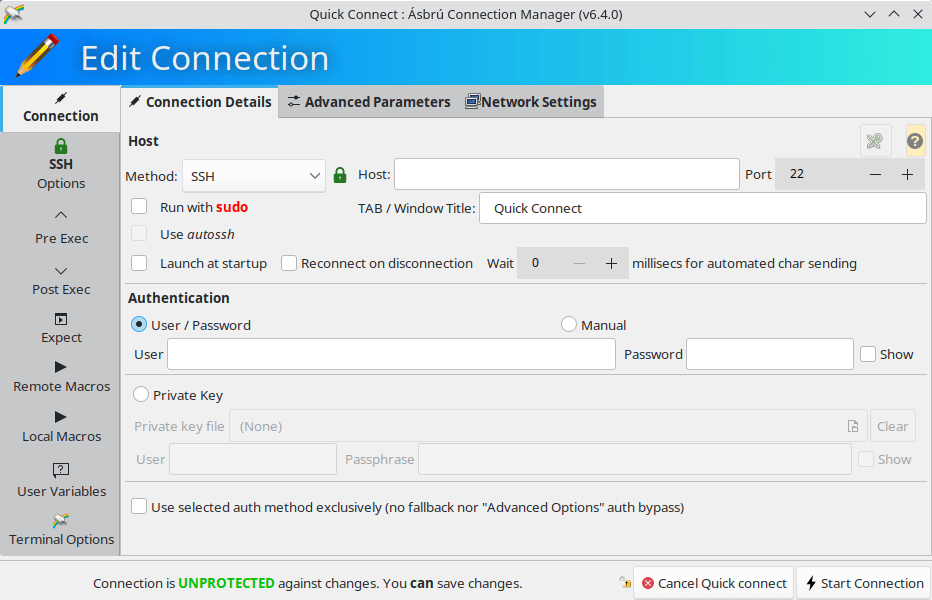SSH was designed as a replacement for Telnet and for unsecured remote shell protocols such as the Berkeley rsh and the related rlogin and rexec protocols. Those protocols send information, notably passwords, in plaintext, rendering them susceptible to interception and disclosure using packet analysis. The encryption used by SSH is intended to provide confidentiality and integrity of data over an unsecured network, such as the Internet. The SSH protocol supports port forwarding.
Ásbrú Connection Manager (Ásbrú) is a user interface that helps organizing remote terminal sessions and automating repetitive tasks. The project began as a fork of PAC (Perl Auto Connector) Manager.
Installation
There are packages for Debian/Ubuntu, Fedora, and a compressed tarball.
We tested the software in Manjaro. There’s a package in the Arch User Repository which goes by the name asbru-cm. We didn’t encounter any issues installing this package. Unusually the package installs the software into a sub-directory off /opt/.
In Operation
This is the window you’ll see when you first start up the software. It’s certainly not the most elegant layout on first inspection.

The complexity of the interface is due, in part, due to the amount of functionality included. Ásbrú is a lot more than a simple interface to establish and manage SSH sessions. To get started focus on the top icon bar and the left hand pane as it lets you create individual connections and groups.
The first thing to do is to create some groups and connections. When creating a connection you’ll see the window.

As you can see, there are a wealth of options available for each connection. Besides SSH, there’s support for a wide range of protocols. We can connect via FTP, IBM 3270/5250, MOSH, RDP (rdesktop and xfreerdp), SFTP, Serial (cu), Serial (remote-tty), telnet, VNC, and WebDAV. When connecting to SSH servers, we recommend using a private key, rather than user/password authentication.
For SSH there are lots of options available including X11 forwarding, using compression, as well as the connection to the agent automatically being forwarded to the remote side.
The software stores your configured connections. It uses a KeePass database file for security purposes.
There are a wealth of customization options available.

Summary
Ásbrú is our recommended open source graphical frontend for SSH. There are so many highlights such as its awesome scripts manager, cluster connections, and the vast array of customization options. The cluster functionality with its power cluster controller lets you group similar servers together and then run the same commands on all the servers in that cluster.
Other highlights include tabbed/windowed terminals, KeePassXC integration, Wake on LAN, the option to connect to machines through a proxy server, pre/post connection local commands executions, remote and local macros, and conditional executions.
Ásbrú is so more much than software to manage SSH connections. It’s a great system admin tool. Just don’t be put off by its idiosyncratic interface.
Website: www.asbru-cm.net
Support: Documentation, GitHub Code Repository
Developer: Gaëtan Frenoy and contributors
License: GNU General Public License version 3.0
Ásbrú Connection Manager is written in Perl. Learn Perl with our recommended free books and free tutorials.
| Popular series | |
|---|---|
| The largest compilation of the best free and open source software in the universe. Each article is supplied with a legendary ratings chart helping you to make informed decisions. | |
| Hundreds of in-depth reviews offering our unbiased and expert opinion on software. We offer helpful and impartial information. | |
| The Big List of Active Linux Distros is a large compilation of actively developed Linux distributions. | |
| Replace proprietary software with open source alternatives: Google, Microsoft, Apple, Adobe, IBM, Autodesk, Oracle, Atlassian, Corel, Cisco, Intuit, SAS, Progress, Salesforce, and Citrix | |
| Awesome Free Linux Games Tools showcases a series of tools that making gaming on Linux a more pleasurable experience. This is a new series. | |
| Machine Learning explores practical applications of machine learning and deep learning from a Linux perspective. We've written reviews of more than 40 self-hosted apps. All are free and open source. | |
| New to Linux? Read our Linux for Starters series. We start right at the basics and teach you everything you need to know to get started with Linux. | |
| Alternatives to popular CLI tools showcases essential tools that are modern replacements for core Linux utilities. | |
| Essential Linux system tools focuses on small, indispensable utilities, useful for system administrators as well as regular users. | |
| Linux utilities to maximise your productivity. Small, indispensable tools, useful for anyone running a Linux machine. | |
| Surveys popular streaming services from a Linux perspective: Amazon Music Unlimited, Myuzi, Spotify, Deezer, Tidal. | |
| Saving Money with Linux looks at how you can reduce your energy bills running Linux. | |
| Home computers became commonplace in the 1980s. Emulate home computers including the Commodore 64, Amiga, Atari ST, ZX81, Amstrad CPC, and ZX Spectrum. | |
| Now and Then examines how promising open source software fared over the years. It can be a bumpy ride. | |
| Linux at Home looks at a range of home activities where Linux can play its part, making the most of our time at home, keeping active and engaged. | |
| Linux Candy reveals the lighter side of Linux. Have some fun and escape from the daily drudgery. | |
| Getting Started with Docker helps you master Docker, a set of platform as a service products that delivers software in packages called containers. | |
| Best Free Android Apps. We showcase free Android apps that are definitely worth downloading. There's a strict eligibility criteria for inclusion in this series. | |
| These best free books accelerate your learning of every programming language. Learn a new language today! | |
| These free tutorials offer the perfect tonic to our free programming books series. | |
| Linux Around The World showcases usergroups that are relevant to Linux enthusiasts. Great ways to meet up with fellow enthusiasts. | |
| Stars and Stripes is an occasional series looking at the impact of Linux in the USA. | |
